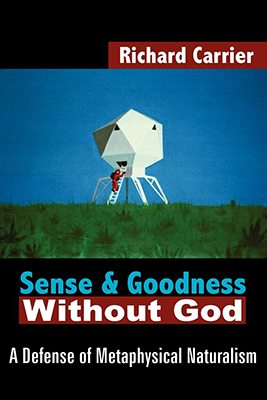Sense & Goodness Without God
“Sense and Goodness Without God” by Richard Carrier is a comprehensive philosophical treatise that presents a worldview known as metaphysical naturalism. Here’s a summary:
Introduction to Metaphysical Naturalism: Carrier introduces the concept of metaphysical naturalism, which asserts that the natural world is all that exists and that everything can be explained through natural phenomena and laws without recourse to supernatural or divine explanations.
Foundations of Naturalism: Carrier lays out the foundational principles of naturalism, including the scientific method, empirical evidence, and reason. He argues that these tools provide the most reliable means of understanding the world and solving its mysteries.
Ethics and Morality: Carrier explores the implications of naturalism for ethics and morality. He argues that morality can be grounded in naturalistic principles such as empathy, reason, and social cooperation, rather than divine commandments or supernatural authority.
Meaning and Purpose: Carrier addresses existential questions of meaning and purpose in a naturalistic worldview. He argues that individuals can find meaning and purpose in their lives through personal fulfillment, relationships, and contributions to society, without the need for belief in a higher power.
Cosmology and Origins: Carrier discusses scientific explanations for the origins and nature of the universe, including the Big Bang theory and the evolution of stars, galaxies, and planets. He emphasizes the power of naturalistic explanations in understanding the cosmos.
Evolution and Biology: Carrier examines the theory of evolution by natural selection and its implications for biology. He discusses the evidence supporting evolution, its mechanisms, and its role in shaping the diversity of life on Earth.
Mind and Consciousness: Carrier explores the nature of consciousness and the mind from a naturalistic perspective. He discusses neuroscience, cognitive psychology, and the idea that consciousness emerges from complex interactions of neural processes in the brain.
Religion and Atheism: Carrier addresses the role of religion in human society and the arguments for atheism. He critiques religious beliefs and practices, arguing that they are not necessary for a fulfilling and meaningful life.
Conclusion: Carrier concludes by summarizing the key points of his naturalistic worldview and its implications for understanding reality, ethics, meaning, and purpose.
Overall, “Sense and Goodness Without God” presents a thorough and systematic defense of metaphysical naturalism, offering a coherent framework for understanding the world and living a meaningful life without reliance on supernatural beliefs.

